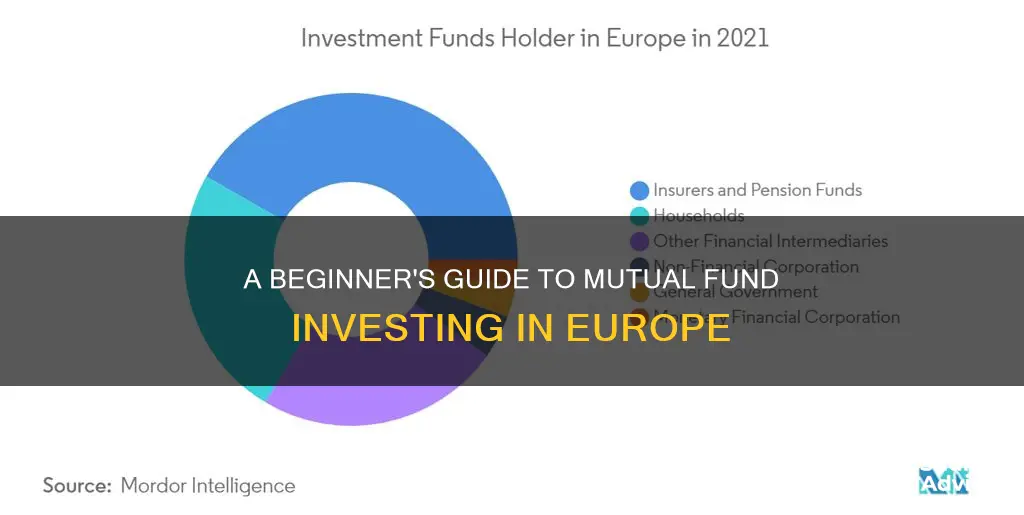
Mutual funds are a great way for individuals to invest their money in the stock or bond market, especially if they have limited funds. They are ideal for investors who want to gain access to diversification benefits but may only have a modest amount to invest. In Europe, mutual funds are governed by regulations from the Undertakings for Collective Investment in Transferable Securities (UCITS). To market a fund across all member countries of the European Union, it needs to be registered in one EU country under the authority of that country's financial regulator. For example, in Ireland, it would be the Irish Financial Services Regulatory Authority. While mutual funds are a great investment option, it is important to note that they differ depending on the investor's domicile.
| Characteristics | Values |
|---|---|
| How to invest | Directly through their provider, or through a bank or investment firm |
| Pros of mutual funds | Access to diversification benefits, even with a modest amount to invest |
| Cons of mutual funds | High fees and sub-par performance |
| Alternative | Exchange-traded funds (ETFs) |
| Pros of ETFs | You can buy them directly on the market, rather than going through a mutual fund provider |
| Mutual funds in Europe | Governed by regulations from the Undertakings for Collective Investment in Transferable Securities (UCITS) |
What You'll Learn

Understand the difference between mutual funds and ETFs
Mutual funds and ETFs (exchange-traded funds) are similar in many ways. They are both professionally managed collections, or "baskets", of individual stocks or bonds. They are both less risky than investing in individual stocks and bonds, as they offer built-in diversification. They both give investors access to a wide variety of U.S. and international stocks and bonds, and they are both overseen by professional portfolio managers.
However, there are some key differences between the two investment types. ETFs can be traded intra-day like stocks, whereas mutual funds can only be purchased at the end of each trading day based on a calculated price known as the net asset value. Mutual funds have been around for much longer than ETFs—the first mutual fund was launched in 1924, while the first ETF debuted in 1993. Mutual funds are usually actively managed, while ETFs are usually passively managed, tracking a market index or sector sub-index. Actively managed funds tend to have higher fees and higher expense ratios due to their higher operations and trading costs. Mutual funds typically have a higher minimum investment requirement than ETFs.
In terms of how they are traded, with mutual funds, you buy and sell shares directly with the fund provider. Transactions only occur after trading ends for the day, and the fund's manager calculates the value of a share. ETFs, on the other hand, trade more like stocks. You can buy and sell shares in an ETF on the open market with other investors. Shares trade throughout the day, so ETFs are a better choice for active traders. ETFs are often cheaper to invest in, as mutual funds typically have minimum investment requirements of hundreds or thousands of dollars, whereas you can invest in an ETF if you have enough money to buy a single share.
Strategies to Secure Investment Funding: A Comprehensive Guide
You may want to see also

Learn about the regulations and governing bodies for European mutual funds
When it comes to investing in mutual funds, it's important to understand the regulatory environment that governs them. In Europe, mutual funds are authorised for sale under the regulations of the Undertakings for Collective Investment in Transferable Securities, or UCITS. The most recent iteration of these rules is called UCITS III, which has a heightened focus on the risk monitoring of derivative positions.
To market a fund across all member countries of the European Union, registration is only required in one EU country, under the authority of that country's financial regulator. For example, in Ireland, this is the Irish Financial Services Regulatory Authority. This authority is then part of the Committee of European Securities Regulators, which coordinates the securities regulators of all EU countries.
Luxembourg and Ireland are the primary jurisdictions for the registration of UCITS funds. These funds can be sold throughout the European Union and in other countries that have adopted mutual recognition regimes.
In the UK, a similar structure to mutual funds is the open-ended investment company (OEIC).
Vanguard Target Retirement Funds: Choosing Your Investment Strategy
You may want to see also

Compare fees and charges for different funds
When comparing fees and charges for different funds, it is important to remember that mutual funds are highly regulated, but the regulations differ by country or region. In Europe, mutual funds authorized for sale are governed by regulations from the Undertakings for Collective Investment in Transferable Securities (UCITS).
When investing in mutual funds, there are several charges to consider. Firstly, there is the Annual Management Charge (AMC) or Annual Management Fee, which covers the fund manager's costs of managing the fund over the year. Additionally, investors may also have to pay running costs, such as administration fees, audit fees, custody fees, and other operational expenses. These running costs, along with the AMC, make up the fund's OCF (Ongoing Charges Figure).
It is worth noting that some fund managers, such as Vanguard, include all running costs in their AMC, making their AMC the same as their OCF. This approach can increase transparency and give investors a better understanding of the cost of their investment.
When comparing fees, it is also important to consider the potential impact of those fees on your expected return. The larger the fund's expenses, the greater the impact on the expected return. Therefore, it is beneficial to consider funds with lower fees and charges, such as the OP-Europe Index Fund, which boasts a low management fee.
Online brokers can also be a useful way to access a wider range of funds at better prices than traditional banks. For example, Active Funds have high buying fees of 3-5%, but these fees are waived by some online brokers.
Finally, it is worth noting that some funds may have additional charges, such as electronic transfer or handling fees charged by your bank. Therefore, it is essential to carefully review all the fees and charges associated with a fund before making an investment decision.
Trust Fund Investment Strategies: Where to Begin?
You may want to see also

Research actively managed funds vs. index funds
When deciding how to invest in mutual funds in Europe, it is important to understand the differences between actively managed funds and index funds. Both types of funds have their own advantages and disadvantages, and the right choice depends on your individual investment goals and risk tolerance.
Actively managed funds are a type of mutual fund where investment decisions are made by individuals or companies based on what they believe will generate the best returns for investors. These funds aim to beat the market by hand-picking investments and actively managing the portfolio. One of the main advantages of actively managed funds is that they offer a higher level of expertise and knowledge of the markets, which can potentially lead to higher returns. Additionally, actively managed funds provide investors with more choices and the potential to support specific industries or sectors. However, one of the drawbacks of actively managed funds is that they typically charge higher fees due to the active management style. These funds may also require more research and have higher taxes due to a higher turnover of the portfolio.
On the other hand, index funds are passively managed and aim to mirror the performance of a specific market benchmark or index. Instead of hand-picking stocks, index funds buy all or a representative sample of the stocks or bonds in the index they are tracking. One of the main benefits of index funds is that they offer lower operating expenses and good long-term outlooks. They are also seen as less volatile investments due to their high level of diversification. However, index funds may offer lower flexibility and choice, and the potential for lower gains compared to actively managed funds.
When choosing between actively managed funds and index funds, it is essential to consider your investment goals, risk tolerance, and the amount of time and effort you are willing to put into researching and managing your investments. Actively managed funds may be suitable for those who want more control over their investments and are willing to pay higher fees for the potential of higher returns. On the other hand, index funds may be a better choice for those who prefer a more passive investment approach, seeking lower fees and long-term growth without the need for active management.
Overall, both actively managed funds and index funds have their advantages and can be part of a well-diversified investment portfolio. It is important to carefully consider your investment objectives, risk tolerance, and fees associated with each type of fund before making a decision.
Mutual Funds: Safe, Diversified, and Profitable Investments
You may want to see also

Consider tax benefits and implications
When considering investing in mutual funds in Europe, it is important to understand the tax benefits and implications. Mutual funds are taxed differently around the world, and there are specific rules pertaining to the registration, marketing, and sale of funds in each country or region. Here are some key points to consider:
Taxation of Mutual Funds in Europe:
- Fund Types: Taxation rules differ based on the type of mutual fund, such as equity, debt, or hybrid mutual funds.
- Dividends: Dividends are a part of the profit distributed among investors by mutual fund houses. Previously, dividends were tax-free for investors as companies paid dividend distribution tax (DDT). However, as per the amendments made in the Union Budget 2020, dividends offered by any mutual fund scheme are now taxed by adding them to the investor's taxable income.
- Capital Gains: Capital gains refer to the profits realised when investors sell their capital assets at a higher price than their total investment amount. These gains are subject to tax and can be categorised as short-term (less than 12 months) or long-term (12 months or longer) capital gains. The taxation rate depends on the holding period and the type of mutual fund.
- Holding Period: The time between the purchase and sale of mutual fund units impacts the tax rate payable on capital gains. In most cases, holding investments for an extended period results in a lower tax amount.
- Securities Transaction Tax (STT): In addition to taxes on dividends and capital gains, there is also an STT levied by the government when buying or selling mutual fund units of an equity fund or a hybrid equity-oriented fund. This tax is typically around 0.001%.
- Tax-Saving Mutual Funds: Under Section 80C of the Income Tax Act, tax benefits are applicable to Equity Linked Saving Schemes (ELSS). Investors can avail tax deductions of up to a certain limit, but ELSS usually has a minimum lock-in period of three years.
- Wealth Tax Exemption: According to the Wealth Tax Act, mutual funds and other financial assets are exempted from any wealth taxes.
Choosing Between Funds:
When choosing between different mutual funds, it is important to consider their after-tax returns. If investing through a taxable brokerage firm account, compare the after-tax returns of various funds as one factor in your decision-making process. On the other hand, if you are using a tax-advantaged retirement account, such as a traditional or Roth IRA, you can focus solely on pre-tax returns and ignore the tax issues.
Taxable Distributions:
Mutual funds make taxable distributions because the Internal Revenue Code requires them to pass out most of their income and gains as dividend distributions to avoid corporate income tax. Certain types of funds, such as index funds and tax-managed funds, tend to minimise taxable distributions by holding investments for longer periods. In contrast, funds that actively churn their portfolios can generate significant distributions in a rising market, leading to higher tax implications.
Unexpected Tax Consequences:
There are certain transactions that mutual fund companies allow, such as check-writing privileges and exchange privileges, which are treated as taxable sales under federal income tax rules. These transactions can result in unanticipated mutual fund share sales and trigger capital gains or losses that must be reported on tax returns. Therefore, it is important to understand the tax ramifications of such transactions.
Buyer and Seller Considerations:
If you buy into a mutual fund shortly before the ex-dividend date, you will receive the upcoming dividend distribution and the associated tax bill. On the other hand, if you sell before the ex-dividend date, you won't receive the upcoming dividend, and your profit will be treated as a lower-taxed long-term capital gain if you've held the shares for more than a year.
Mutual Funds: Investors Seek Diversification and Professional Management
You may want to see also
Frequently asked questions
Mutual funds are ideal for investors with limited funds as they can gain access to diversification benefits with a modest amount to invest. Investors don't have to make decisions about which individual stock to buy, they simply decide what portfolio suits them best.
You can invest in mutual funds directly through their provider or through a bank or investment firm. You can also invest through online brokers, who will give you a wider choice than traditional banks.
When you invest with any fund manager, you will have to pay an Annual Management Charge (AMC) which covers the fund manager's own costs of managing the fund over the year. With most managers, you will also pay additional running costs, including administration fees, audit fees, custody fees, and other operational expenses.
The value of investments can rise and fall, and the investor may lose part of or all of the invested funds. The larger the fund's expenses, the greater the impact on the expected return on the investment. Any yield also depends on taxation, which varies depending on the investor's personal circumstances and can change in the future.







